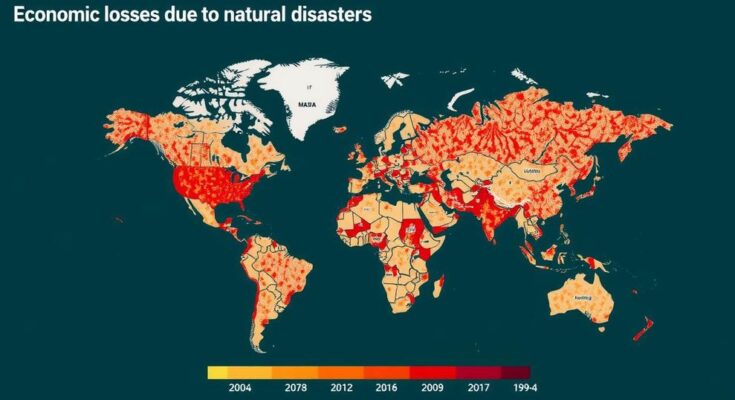Natural disasters in 2024 resulted in $310 billion in global economic losses, a 6% increase from 2023. Insured losses reached $135 billion, significantly influenced by hurricanes in the U.S. and flooding in Europe. This trend, attributed to climate change and urbanization, raises concerns about future losses and emphasizes the need for meaningful adaptation strategies.
In a year anticipated to be recorded as the hottest on record, natural disasters have resulted in a staggering $310 billion in economic losses globally in 2024, as reported by Swiss Re on Thursday. This figure represents a six-percent increase compared to 2023, which currently holds the title for the hottest year to date. Insured losses also rose significantly, reaching $135 billion, influenced by catastrophic events such as hurricanes Helene and Milton in the United States and severe flooding across Europe. This marks the fifth consecutive year in which total insured losses surpassed $100 billion.
According to Balz Grollimund, the head of catastrophe and perils at Swiss Re, the rising loss figures can be largely attributed to the concentration of value in urban settings, ongoing economic expansion, and escalating costs of reconstruction. As one of the leading reinsurance firms, Swiss Re emphasized the pressing consequences of climate change, signifying that this year could be declared the hottest year since records began.
The impacts of global warming create conditions for more frequent and severe weather phenomena due to elevated temperatures and the resultant effects of increased heat trapped in both the atmosphere and oceans. Grollimund noted, “By favouring the conditions leading to many of this year’s catastrophes, climate change is also playing an increasing role.”
The European Union’s climate monitoring entity, Copernicus, has predicted that 2024 will exceed 1.55 degrees Celsius above the temperature averages from 1850 to 1900, prior to significant fossil fuel emissions. Although this increase does not constitute a breach of the Paris Climate Agreements, which aim to keep global warming below 2 degrees Celsius, experts warn that this critical threshold of 1.5 degrees Celsius is quickly becoming unattainable, with each incremental rise bringing about more destructive ramifications.
Swiss Re has specifically highlighted the growing costs associated with flooding, reporting that 2024 was the third most expensive year for flood-related losses worldwide and the second for Europe. Severe flooding, particularly after Storm Boris in September in Central Europe, resulted in insured losses amounting to approximately $10 billion this year and tragically claimed at least 230 lives in Spain.
In the United States, hurricanes Helene and Milton wreaked havoc, culminating in insured losses estimated near $50 billion, constituting a significant portion of global losses. The prevalence of these severe weather events led the United States to account for about two-thirds of insured losses this year.
Looking ahead, Swiss Re has cautioned that global insured losses are expected to increase, exacerbated by the effects of climate change exacerbating extreme weather events alongside rising asset values in urbanized areas at risk. To mitigate these losses, the firm advocates for adaptive strategies, asserting that protective infrastructures such as levees and floodgates are significantly more cost-effective than reconstruction efforts after disasters strike.
The article addresses the economic impact of natural disasters in 2024, attributing substantial losses to increasing climate change effects which have intensified weather phenomena. Swiss Re, a significant player in the reinsurance industry, provides key data and insights regarding the rising trends in insured losses, emphasizing the urgent need for adaptation and protective measures against the backdrop of urbanization and global warming.
In summary, natural disasters in 2024 have led to unprecedented economic losses, significantly fueled by the escalating effects of climate change. With insured losses once again surpassing the $100 billion mark, the need for preventive measures and urban adaptation has become paramount. Swiss Re highlights that without such adaptations, the costs associated with these disasters will only continue to grow, underscoring the inevitable relationship between climate change and economic vulnerability.
Original Source: www.fox28spokane.com




